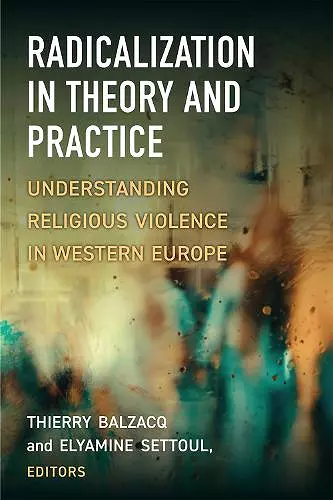Radicalization in Theory and Practice
Understanding Religious Violence in Western Europe
Thierry Balzacq author Elyamine Settoul author Thierry Balzacq editor Elyamine Settoul editor
Format:Paperback
Publisher:The University of Michigan Press
Published:6th Dec '22
Currently unavailable, our supplier has not provided us a restock date

Radicalization is a major challenge of contemporary global security. It conjures up images of violent ideologies, “homegrown” terrorists and jihad in both the academic sphere and among security and defense experts. While the first instances of religious radicalization were initially limited to second-generation Muslim immigrants, significant changes are currently impacting this phenomenon. Technology is said to amplify the dissemination of radicalism, though there remains uncertainty as to the exact weight of technology on radical behaviors. Moreover, far from being restricted to young men of Muslim heritage suffering from a feeling of social relegation, radicalism concerns a significant number of converted Muslims, women and more heterogeneous profiles (social, academic and geographic), as well as individuals that give the appearance of being fully integrated in the host society. These new and striking dynamics require innovative conceptual lenses.
Radicalization in Theory and Practice identifies the mechanisms that explicitly link radical religious beliefs and radical actions. It describes its nature, singles out the mechanisms that enable radicalism to produce its effects, and develops a conceptual architecture to help scholars and policy-makers to address and evaluate radicalism—or what often passes as such. A variety of empirical chapters fed by first-hand data probe the relevance of theoretical perspectives that shape radicalization studies. By giving a prominent role to first-hand empirical investigations, the authors create a new framework of analysis from the ground up. This book enhances the quality of theorizing in this area, consolidates the quality of methodological enquiries, and articulates security studies insights with broader theoretical debates in different fields including sociology, social psychology, economics, and religious studies.
“This important book offers a clear contribution to the literature through its focus on multi-faceted and non-linear explanations for radicalization. The collection emphasizes the importance of local and social contexts in understanding how radicalization is made possible.”
—Christopher Baker-Beall, Bournemouth University
* Christopher Baker-BeaISBN: 9780472055142
Dimensions: unknown
Weight: unknown
296 pages